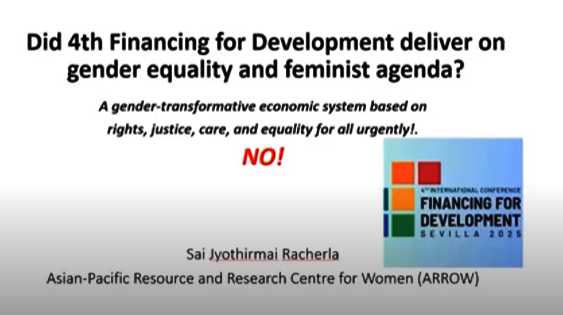
The 4th International Conference on Financing for Development (FfD4), held in Seville, Spain, from June 30 to July 3, 2025, ended on a disappointing note for countries in the Global South and civil society organizations. The final document, the “Compromiso de Sevilla,” is widely seen as a missed opportunity to create a fairer and more equitable global financial system. Participants have denounced it as a failure that maintains the status quo and ignores urgent calls for structural change.
During a recent webinar hosted by She & Rights on the occasion of World Population Day, IAS 2025, and HLPF 2025, Sai Jyothirmai Racherla from the Asian-Pacific Resource and Research Centre for Women (ARROW) highlighted the conference’s deep-seated inadequacies. The webinar was chaired by Shobha Shukla (Founding Executive Director of CNS and SHE & Rights Coordinator). Several other experts also spoke on the topic.
“Global poverty reduction has almost stalled,” Sai Jyothirmai Racherla stated, pointing out that nearly 9% of the world’s population was still living in extreme poverty in 2022. She also noted that low-income countries have seen almost no improvement in their social protection coverage since 2015.

A diluted and ineffective « Compromiso de Sevilla »
The main criticism of the « Compromiso de Sevilla » is its lack of ambition on crucial issues like international taxation and sovereign debt. According to Ms. Sai Jyothirmai, the document is a « diluted » version of the goals originally set by the Addis Ababa Action Agenda, thereby compromising other international commitments such as those from the International Conference on Population and Development (ICPD) and the Beijing Platform.
The text, weakened by negotiations, sidelined bold proposals from African countries and small island states, especially on debt cancellation. The call for creating a UN Framework Convention on International Tax Cooperation, which is essential to fight against multinational corporate tax evasion, was significantly softened.
Women’s rights at risk
The lack of financial commitment and failure to address systemic inequalities were particularly condemned by feminist organizations. Ms. Sai Jyothirmai stressed that the FfD4 was an ideal platform to reaffirm gender equality and a transformative financing agenda, but it failed to deliver on its promises.
The figures she presented are alarming: “Two pregnant people die every minute. 700 women die every day from preventable causes related to pregnancy and childbirth, mainly in sub-Saharan Africa and South Asia.” These statistics illustrate a glaring lack of adequate health services. She concluded by questioning the signatories’ true commitment: “If we are to truly advance gender equality, we must begin by improving the sexual and reproductive health and rights of women and girls in all their diversity, as a fundamental starting point, and ensure that financial resources are adequately allocated… Did we even find a single mention of SRHR in the final document?”
The Seville failure reinforces the belief that social and economic justice won’t come from major conferences but rather from a continuous and coordinated mobilization of civil society and nations that are on the front lines of systemic crises.
Note that the SHE & Rights session was jointly organized by the Centre for Health Diplomacy and Inclusion (CeHDI), the International Conference on Family Planning (ICFP 2025), the Family Planning News Network (FPNN), the International Planned Parenthood Federation (IPPF), the Asian-Pacific Resource and Research Centre for Women (ARROW), the Women’s Global Network for Reproductive Rights (WGNRR), the Asia-Pacific Media Alliance for Health and Development (APCAT Media), and CNS.
Ambroisine MEMEDE



